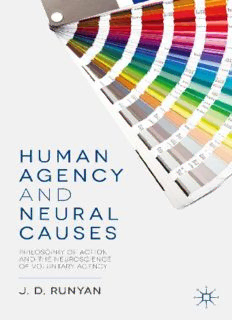
Human Agency and Neural Causes: Philosophy of Action and the Neuroscience of Voluntary Agency PDF
Preview Human Agency and Neural Causes: Philosophy of Action and the Neuroscience of Voluntary Agency
Human Agency and Neural Causes This page intentionally left blank Human Agency and Neural Causes Philosophy of Action and the Neuroscience of Voluntary Agency J. D. Runyan Indiana Wesleyan University, USA © Jason Douglas Runyan 2014 All rights reserved. No reproduction, copy or transmission of this publication may be made without written permission. No portion of this publication may be reproduced, copied or transmitted save with written permission or in accordance with the provisions of the Copyright, Designs and Patents Act 1988, or under the terms of any licence permitting limited copying issued by the Copyright Licensing Agency, Saffron House, 6–10 Kirby Street, London EC1N 8TS. Any person who does any unauthorized act in relation to this publication may be liable to criminal prosecution and civil claims for damages. The author has asserted his right to be identified as the author of this work in accordance with the Copyright, Designs and Patents Act 1988. First published 2014 by PALGRAVE MACMILLAN Palgrave Macmillan in the UK is an imprint of Macmillan Publishers Limited, registered in England, company number 785998, of Houndmills, Basingstoke, Hampshire RG21 6XS. Palgrave Macmillan in the US is a division of St Martin’s Press LLC, 175 Fifth Avenue, New York, NY 10010. Palgrave Macmillan is the global academic imprint of the above companies and has companies and representatives throughout the world. Palgrave® and Macmillan® are registered trademarks in the United States, the United Kingdom, Europe and other countries. ISBN 978–1–137–32948–6 This book is printed on paper suitable for recycling and made from fully managed and sustained forest sources. Logging, pulping and manufacturing processes are expected to conform to the environmental regulations of the country of origin. A catalogue record for this book is available from the British Library. A catalog record for this book is available from the Library of Congress. Typeset by MPS Limited, Chennai, India. To S., D., and E. This page intentionally left blank Contents List of Figures ix Acknowledgements x 1 Introduction 1 1.1 What is at issue 1 1.2 An outline of the work ahead 6 1.3 A different approach to a familiar topic: Undercutting the contemporary compatibilist/ incompatibilist debate 9 2 Libet-Style Experiments and Volitions 16 2.1 Introduction 16 2.2 L ibet-style experiments and the problem they present for volitional accounts 18 2.3 Volitional rebuttals to Libet-style problems 23 2.4 C onceptual and empirical grounds for rejecting volitional accounts 30 2.5 Conclusions 42 3 The Need for an Analysis of Human Agency 45 3.1 Introduction 45 3.2 Volitional accounts, action and awareness 46 3.3 A n analytic approach reaffirming a broadly-A ristotelian account of human agency and voluntary conduct 53 3.4 Conclusions 55 4 An Aristotelian Account of Human Agency 57 4.1 Introduction 57 4.2 Wants and choices 59 4.3 Human agency 61 4.4 Awareness and choosing 72 4.5 Conclusions 83 5 Compatibilist Concerns 86 5.1 Introduction 86 5.2 Incompatibilist implications 88 5.3 P ossible compatibilist objections and incompatibilist replies 96 vii viii Contents 5.4 Implications for compatibilist accounts of deliberation 98 5.5 Conclusions 101 6 Choices and Voluntary Conduct 103 6.1 Introduction 103 6.2 Bodily motion, action and choices 105 6.3 Power to choose and voluntary agency 106 6.4 Frankfurt-type examples 111 6.5 T he illusion of voluntary agency and social psychology 115 6.6 Conclusion 124 7 Neuronal Mechanisms and Voluntary Agency 126 7.1 Introduction 126 7.2 Human agency and subpersonal causes 134 7.3 The distinctiveness of complex neural systems 144 7.4 W hy upholding exhaustively mechanistic theories is contradictory or self-refuting 155 7.5 Conclusions 165 8 A Metaphysical Framework: Voluntary Agency, Emergence and Downward Causation 166 8.1 Emergence and voluntary agency 166 8.2 Toward an emergentist account of voluntary agency 174 8.3 C oncluding remarks: Two contrasting depictions of the universe 180 Notes 193 Index 228 List of Figures 1.1 ‘My Wife and My Mother-in-Law’ Illusion 14 2.1 Approximate time course of events during Libet-style experiments (Illustration: A. Pickering, 2013) 18 2.2 An illustration of a lateral view of the human brain with the motor cortex (M1), the dorsal (PMd) and ventral premotor areas (PMv), the supplementary motor areas (SMA) and the posterior parietal cortex (PPC) outlined and labelled (Illustration: A. Pickering, 2013) 20 6.1 Partial taxonomy of kinds of human behaviour 107 7.1 An extremely simplified illustration of basic ion flux and neurotransmitter release and binding between a pre-synaptic and post-synaptic neuron 146 7.2 A small fraction of the intracellular neurobiochemicals activated by metabotropic receptors integral to both neurophysiological activities and long-term neuronal changes, which influence future neurophysiological activity (Illustration: A. Pickering, 2013) 147 ix
Description: